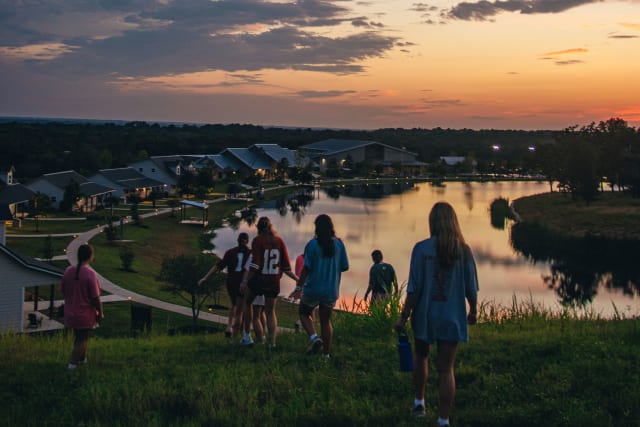

When parents dream and pray about their children’s future, they often envision the extracurricular activities they’ll participate in, the church youth groups they’ll join, and the universities they’ll eventually attend. Less frequently thought of—though still prevalent—is anxieties they may develop along the way.
Anxiety is at an all-time high for the generation born since 1995, an idea explored thoroughly in Jonathan Haidt’s excellent book The Anxious Generation. Though not faith-based, Haidt’s book features an abundance of useful data and valuable insights. Those parenting this generation won’t be surprised to read that the rise in smartphone use and the looming giant of social media can be blamed for much of today’s anxiety and unrest.
Key to this social media-fueled anxiety is its uber-addictive qualities. Kevin East, a longtime camper dad and current President & CEO of the Mentoring Alliance (who formerly served as Pine Cove’s Executive Director of Ministries), knows firsthand the dangers of social media. As a father of five, he is frequently on the lookout for its effects. “You are so enveloped in this screen world that you don’t know how enslaving it is,” Kevin tells his kids. “You don’t know how addictive or how entangling it is. You don’t recognize it until you get away from it.”
Another insidious facet of children and teens having access to smartphones? Isolation.
“I’ve always told my kids, I don’t want you isolated. The enemy wants to isolate you,” Kevin explains. “And I think for a lot of kids today, they’re isolated in the midst of a very social online world… They get isolated, and their brains don’t have the capacity to just continue to flex that much. It’s like it needs space to breathe, and they don’t have that.”
Kids need the opportunity to step away from screens and technology and into a space where they can push boundaries, experience true community, and encounter Christ-centered role models, all in a safe, outdoor (and completely phone-free) environment. It’s the kind of environment that feels closest to what God intended in the beginning—the very beginning.
Years ago, after a dad had picked up his kids from Pine Cove, he sent a message to Taylor ‘Fish Face’ Jervis, Senior Shores Director and Vice President of Youth Camping. “He ended with the one-liner essentially saying, ‘Camp is closer to the life that God intended than anywhere outside of it,’” Taylor recalls. “Camp is a safe environment to live, to try new things, to fail, to meet new people where judgment is decreased to an extent because of the culture and the environment that we try to create at Pine Cove.”

Freedom is a common theme when considering what today’s adolescents lack in their everyday lives—and what they can gain at camp. “What we try to do in any great environment, culture, or place is make it so there is freedom to be you,” Taylor explains. “There is freedom to meet people without the fear of judgment, but there’s also very clear boundaries. And I’m not just talking about rules, but, ‘Hey, here’s how we interact with each other. Here’s how we love each other.’ There’s so much freedom within very clear boundaries that is a very peaceful but strong structure to grow within.”
Within the context of safety and supervision, that freedom allows children to explore, grow, and test their own skills and abilities.
“Camp is dangerous, right?” Kevin contends. “It’s meant to be safely dangerous, I would call it. You get a kid up at 30 feet in a tree in a ropes course, and when staff have been trained right and they’re doing it right, it’s safely dangerous.”
Danger may be the last word a parent wants to hear when thinking about sending their kid to camp on their own. But it’s a necessity, Kevin explains. “[Kids] need to experience those feelings of autonomy, of community, of danger, of ‘I have what it takes. I climbed to the top of that pamper pole, and I jumped off of it. I tried skiing for the first time, and I did it. I went through the forest at night trying to get to the Commando tower, and I was able to do it.’ It gives kids a series of accomplishments that they can’t get at home.”
This is an assertion supported by Jonathan Haidt. As he explains in The Anxious Generation, “Play with some degree of physical risk is essential because it teaches children how to look after themselves and each other. Children can only learn how to not get hurt in situations where it is possible to get hurt.”
Of course, with safety being one of Pine Cove’s top priorities, the chances of true danger or real hurt are extremely low, especially amidst a well-trained staff and supportive community of counselors and fellow campers.
“Camp offers a bunch of different scenarios where you’re able to show ‘I have what it takes’ in the midst of a community of great godly summer staff who are cheering for you and rooting for you and speaking into you and encouraging you,” Kevin says.

These supportive camp communities, all joyously and unashamedly cheering one another on, wouldn’t be possible without the Christ-centered college staffers who take on the mantle of being role models for campers of all ages. These staffers are the incredible hands and feet of Jesus who walk alongside kids and teens going through hardships at home. They’ve said, “Here am I, send me.” And God has sent them to camp.
Kappi Helms has sent all three of her children to Pine Cove every summer since 2013. One reason her family sees value in signing up for camp each year? Those stellar, college-aged role models.
“Kids can’t look at their parents and go, ‘Oh, I hope I’m like them one day.’ What they can do is they can look at a kid that’s like 10 years older than them, and they can see, ‘Wow, this guy is cool, but also loves Jesus and is funny or fun or real,’ and they can go, ‘I want that.’”
Instead of focusing on a screen, whether it’s displaying a video game or text messages or an Instagram feed, campers get the opportunity to turn their attention to real, tangible examples of faith and community.
“I think people spend an average of five plus hours a day on their iPhones,” Taylor says. “But transferring that just for six days—all of that time going from phones is actually going toward being invested into by a college student a few years ahead of them. And they actually have to sit down with that college student who’s been well trained and will ask them the deeper questions of, ‘What are things you’re walking through? What’s some stuff you’re excited about in your life? What are things that are really difficult?’”
These may be questions some campers have never been asked before. At least, not by a Christian role model who truly cares about what they have to say. “They get real feedback from these college students who have been where they’ve been and are doing their best to follow God—someone a step or half a step ahead of them in life and in faith,” Taylor continues. “Instead of all those hours going towards a phone—scrolling or watching or reading something on the screen—they’re going to a face-to-face relationship that has great power.”
All of that soul-reinforcing mentorship and care happens in what Dr. Tim Kimmel of the ministry Grace Based Families calls ‘an atmosphere of grace.’ Kevin explains, “I think this is something that Pine Cove does really well: an atmosphere of grace where kids feel safe, they feel loved, they feel protected… You have a counselor who’s fostering an atmosphere of grace, and then in that, their hearts become tender to the things of God.”
Just as all of creation whispers His name, so do all the aspects of camp that kids get to witness during their time away. Counselors are relaying activities back to the Lord. Space usually filled with screens instead gives campers the time to wonder. It all works together to nudge campers’ spirits and let them long for the things above in a distraction-free environment.
“The friendships and love that my kids get when they go every [summer] is so amazing and necessary in today’s world,” shares camper mom Kenlyn Jones. “They have two weeks where there’s no TV, no cell phones, no TikTok… just outdoor activities and God. It doesn’t get any better.”
Overnight youth camp may not be for everyone, for a variety of reasons. But for those who are able to attend a week away at summer camp, the question becomes, Why wouldn’t you? With so many benefits waiting to be reaped—and so few other places offering them—a camp session at Pine Cove (or any other God-honoring summer camp) seems like a no-brainer. Of course, some parents still need convincing.
“I would probably ask parents to consider in what environments their kids currently have the opportunity to experience new things out in God’s creation that are new to them, that are challenging to them, where people will be cheering for them,” Kevin says. “In other words, ‘Hey, look, if you don’t think camp’s going to do that much, tell me where your kids are getting this type of experience. Tell me where they’re doing things that are pushing them beyond their comfort zone in a good and healthy way. Tell me how they’re doing something outside of the digital world that is allowing them to understand the strength that God has given them.'”

With all of the outside influences vying for the attention of kids and teens today, it seems increasingly essential to guard them from the endless stream of images and ideas presented to them.
“Do you think it’s valuable for your kid’s heart and mind to have a Sabbath from a constant barrage of information and advertisers trying to control access to your kids’ brains or get their attention for a millisecond?” Kevin questions. “I mean, where can they find rest from that?”
Of course, that feeling of unrest (and the overall role of anxiety) can also extend to the parents as well—especially when it comes to the idea of sending their children to a new environment like summer camp. Mom Kappi Helms knows a little something about that. “You can trust that [God] is in control, and He’s taking care of your child.”
And it’s worth it—even when it’s happening outside of the parent’s purview. “Camp is going to help your child be independent,” Kappi shares. “It’s going to help them get some grit, be an independent thinker, doer, a new friend, that kind of thing. So give them the opportunity now while they’re very safe, rather than waiting until they’re in college to do all those things where the environment is completely out of your control!”
All of the talk about anxiety and overall mental health can feel like a recent development, unique to the 21st century. Actually, Taylor points out, “Anxiety is not a new thing. You look in the Bible, and literally, the most quoted thing that God says is, ‘Do not fear.’ And then He always follows it up with, ‘For I’m with you.’”
Taylor goes on to explain that Jesus addresses anxiety in the Sermon on the Mount, encouraging His followers to trust Him with their needs. “He says, ‘Just follow me. Just seek the kingdom. And when fear comes along, when anxiety comes along, that’s okay.
Just give it to me and let’s walk through it together.’”
Posted Mar 20, 2025
Categories: Parenting, Stories (Browse all)
|
Tags: technology, transformed
Click here to sign up for our Inside the Cove newsletter!